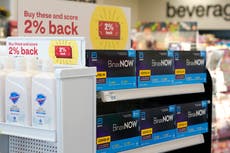Private health insurance companies will cover up to eight at-home tests a month under Biden plan
Insurers required to cover costs for over-the-counter rapid tests up front or through reimbursement forms
Americans with private medical insurance plans can have the costs of up to eight over-the-counter at-home Covid-19 tests covered per month, according to a plan outlined by Joe Biden’s administration.
Under the plan, which is effective from 15 January, people who provide their insurance information to certain in-network pharmacies will be able to get their tests without any paying any out-of-pocket costs.
Otherwise, people will have to file claims with their insurers to be reimbursed for the tests, which can range from $10 up to $35.
The plan “means that most consumers with private health coverage can go online or to a pharmacy or store, buy a test, and either get it paid for up front by their health plan, or get reimbursed for the cost by submitting a claim to their plan,” according to a statement from the White House and US Department of Health and Human Services on 10 January.
The plan pushes insurers and group health plans to make tests available directly through a preferred pharmacy to avoid out-of-pocket costs and the need to file for a reimbursement. Insurers will still be required to reimburse tests purchased out of network, but at a rate of up to $12 per test.
Under the policy, a family of four on the same health coverage can get a total of 32 tests a month.
White House officials defended the proposal after it was announced last month amid a widespread shortage of at-home tests at pharmacies, the emergence of a more-contagious Omicron variant and spiking infections as millions of Americans prepared for winter holidays.
Rather than wait for more than month to be eligible for reimbursements, which are not retroactive, critics argued that the administration should make tests freely available to all Americans without any upfront costs.
On 6 December, press secretary Jen Psaki appeared to mock the idea of the government mailing them to households, and coronavirus response coordinator Jeff Zeints said on 7 December that the reimbursement plan is the “most efficient and effective approach” to testing in the US.
Later this month, the administration will launch a website where people can request at-home tests be mailed to them at no charge. The administration is making 500 million tests available.
In 2020, roughly 66.5 per cent of insured Americans have private insurance, compared to 35.8 per cent with public coverage.
Roughly 155 million Americans rely on insurance through their employer, though the average premium for family coverage has increased 22 per cent over the last five years and 47 per cent over the last decade, outpacing wages and inflation, according to a January report from the Kaiser Family Foundation.
Before the pandemic, a quarter of Americans also said they were putting off treatment for serious medical conditions because of the cost, underscoring an issue of “underinsured” Americans who pay into plans but face costly upfront fees for care.
Americans with public insurance through Medicare and Medicaid programmes are ineligible for reimbursements, though Medicare covers at-home tests when ordered by a physician.
The policy also does not cover out-of-pocket costs for the roughly 30 million uninsured Americans.
State Medicaid and the Children’s Health Insurance Program are required to cover at-home tests without cost-sharing.
Widely available testing has become a vital component, along with vaccines and face coverings, to help control infections during the public health crisis.
Results from rapid tests have become an integral part of the nation’s “reopening” as millions of Americans balance a public health crisis with the demands of school and work for themselves and their families,
Rapid tests take roughly 15 minutes and are able to quickly detect virus proteins that trigger the production of antibodies. Polymerase chain reaction (PCR) tests are generally more accurate but take longer to process.
But availability and access to PCR testing and antigen rapid tests at public sites and clinics has varied widely across the US, and in-demand at-home kits were subject to supply shortages and come with relatively high prices compared to other countries where tests are cheap or free and widely available.
A November report from the Kaiser Family Foundation found that the relatively high cost and lack of insurance coverage for at-home tests created barriers to expanding such testing in the US, despite the required need for test results for returning to school or work, without enhanced federal and state safety nets to keep people home.
Join our commenting forum
Join thought-provoking conversations, follow other Independent readers and see their replies
Comments
Bookmark popover
Removed from bookmarks